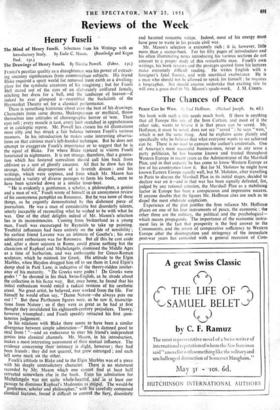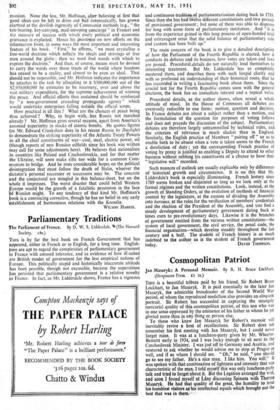The Chances of Peace
Peace Can be Won. It% Paul Hoffman. (Michael Joseph. 8s. 6d.)
No book with such a title needs much bush. If there is anything that all Europe this side of the Iron Curtain, and most of it the other side, wants to believe it is that peace can be saved. Mr. Hoffman, it must be noted. does not say " saved " ; he says "won," which is not the same thing. And he explains quite plainly and specifically why he believes that what everyone wants to see achieved can be. There is no need to canvass the author's credentials. One of America's most successful business-men, never in any sense a party politician, he has become known and trusted throughout Western Europe in recent years as the Administrator of the Marshall Plan, and in that capacity he has come to know Western Europe as few of his countrymen know it. But for M. Molotov he might have known Eastern Europe equally well, but M. Molotov, after travelling to Paris to discuss the Marshall Plan in its initial stages, decided to declare war on it—and in that war has been signally defeated, for, judged by any rational criterion, the Marshall Plan as a stabilising factor in Europe has been a conspicuous and impressive success. If anyone doubts that the figures Mr. Hoffman cites are such as to dispel the most obdurate scepticism.
Experience of the plan justifies the firm reliance Mr. Hoffman places on one of his four instruments of peace, the economic ; the other three are the military, the political and the psychological— which means propaganda. The importance of the economic instru- ment lies in the fact that prosperity is the best answer to the Communists, and the return of comparative sufficiency to Western Europe after the disintegration and stringency of the immediate post-war years has coincided with a general recession of Corn- munism. None the less, Mr. Hoffman, after believing at first that good ideas can be left to drive out bad automatically, has grown alarmed at the devilish ingenuity of Communist methods (e.g., "the talc-bearing, key-carrying, mail-snooping concierge" in France) and the measure of success with which every political and economic grievance is exploited. Hence his insistence on new efforts on the information front, in some ways the most important and interesting feature of his book. " First," he affirms, "we must crystallise a free-world doctrine which reflects the ideals and strivings of free men around the globe ; then we must find words with which to express the doctrine." And then, of course, means must be devised to carry the words over those tracts of the world where freedom has ceased to be a reality, and almost to be even an ideal. That should not be impossible, and Mr. Hoffman indicates the importance he attaches to the task by allocating to it S300,000,000 out of the $2,950,000,000 he estimates to be necessary, over and above the vast military expenditure, for the supreme achievement of winning the peace. And official efforts thus sustained should be reinforced by " a non-government crusading propaganda agency" which would undertake enterprises falling outside the official scope.
How practical is all this ? What are the chances of peace being thus achieved ? Why, to begin with, has Russia not marched already ? Mr. Hoffman gives several reasons, apart from America's assumed superiority in stocks of atomic bombs. He quotes figures (as Mr. Edward Crankshaw does in his recent Russia by Daylight) to demonstrate the striking superiority of the Atlantic Treaty Powers in all the chief constituents of war—coal, steel, electric power, oil (though reports of new Russian oilfields since his book was written may call for some adjustments here). He believes that nationalism in countries like Poland and Czechoslovakia, and for that matter the Ukraine, will soon make rifts too wide for a common Com- munism to bridge. And he rests considerable hopes on the political
disintegration that must follow the death of Stalin, whoever the dictator's personal successor or successors may be. The concrete and the conjectural are mingled in this balance-sheet, but on the whole it impresses. The worst disaster that could befall Western Europe would be the growth of a fatalistic pessimism in the face bf Russian might. To any tendency of that kind Mr. Hoffman's book is a convincing corrective, though he has no belief in any early 'establishment of harmonious relations with the Kremlin.
WILSON HARRIS.



































 Previous page
Previous page